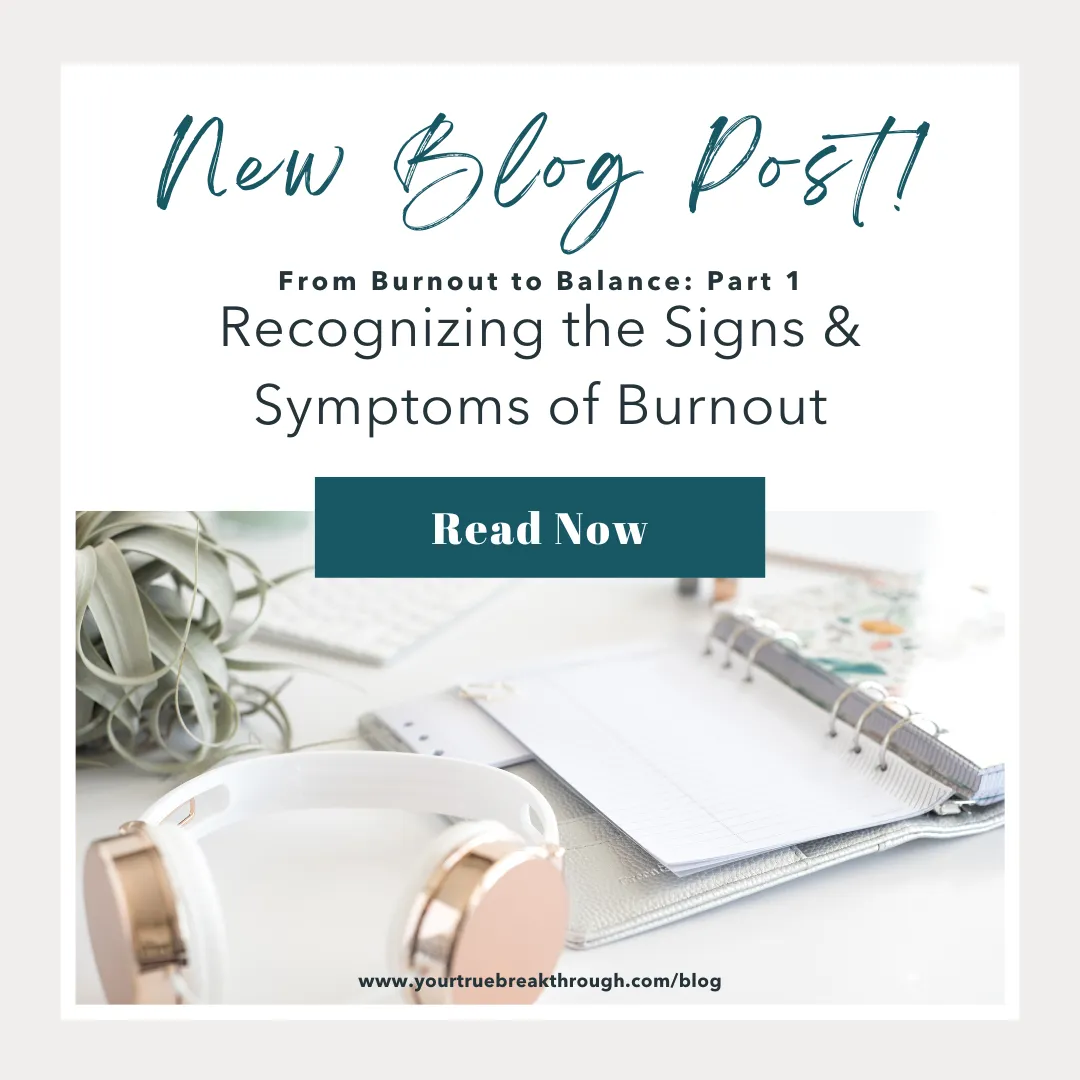Blog

From Burnout to Balance: Part 1 - Recognizing the Signs and Symptoms of Burnout
Burnout is a state of emotional, physical, and mental exhaustion caused by excessive and prolonged stress. It occurs when you feel overwhelmed, emotionally drained, and unable to meet constant demands. As the stress continues, you begin to lose the interest and motivation that led you to take on a certain role in the first place.
According to a recent study by Deloitte, a staggering 77% of respondents reported experiencing burnout at their current job. This alarming statistic underscores the importance of recognizing the signs of burnout and taking proactive steps to manage it.
Exhaustion and Its Effects
Exhaustion is often the first sign of burnout. It can manifest in various ways, including insomnia, chronic fatigue, and reduced productivity. You may find yourself feeling tired all the time, even after a good night's sleep. Your work may start to suffer as tasks that were once easy become increasingly difficult.
Managing Exhaustion:
Prioritize Rest: Make sure you're getting enough sleep each night. Adults typically need between 7 to 9 hours of sleep. If you're consistently getting less than this, it might be time to reassess your sleep schedule. For example, you might establish a regular bedtime routine that helps signal to your body that it's time to sleep.
Set Boundaries Around Work: This could mean setting specific work hours and sticking to them, or making sure you're not checking your work emails after a certain time. For instance, you might decide that you won't work past 6 p.m. or that you won't check your work emails after 8 p.m.
Take Regular Breaks: Breaks can help prevent burnout by giving your mind a chance to rest and recharge. This could be a short 5-minute break every hour, or a longer break for lunch. For example, you might take a short walk, do a quick workout, or just sit quietly with a cup of tea.
De-personalization and Emotional Detachment
Burnout can also lead to de-personalization, a state where you disconnect from your own thoughts, feelings, and sense of identity. This can result in a lack of empathy and caring, leading to emotional detachment in the workplace. You may find yourself becoming cynical or critical at work, distancing yourself from colleagues, or feeling unfulfilled by your work.
Combating De-personalization:
Reconnect with Your Emotions and Values: This could involve taking time each day to reflect on your feelings and what's important to you. For example, you might keep a journal where you write about your emotions and values.
Practice Mindfulness Exercises: Mindfulness can help you stay connected to the present moment and your emotions. This could involve practices like meditation, deep breathing, or yoga. For instance, you might start each day with a 10-minute meditation session.
Seek Support: If you're feeling disconnected from your emotions, it can be helpful to talk to someone about it. This could be a trusted colleague, a coach, or a therapist. For example, you might schedule regular check-ins with a mentor or coach to discuss your feelings and challenges.
Self-Medicating and Coping Mechanisms
In response to the stress of burnout, some individuals might resort to self-medicating behaviors such as excessive drinking, overeating, or misuse of drugs. While these behaviors might provide temporary relief, they can lead to more harm in the long run.
Adopting Healthier Coping Mechanisms:
Regular Exercise: Regular physical activity can help reduce stress and improve your mood. This doesn't have to be intense exercise - even a short walk can be beneficial. For instance, you might start your day with a 30-minute walk or bike ride.
Balanced Diet: Eating a balanced diet can help keep your energy levels stable and reduce feelings of stress. This could mean eating plenty of fruits and vegetables, lean proteins, and whole grains. For example, you might aim to include at least one serving of vegetables in each meal.
Relaxation Techniques: Techniques like meditation, deep breathing, or yoga can help reduce stress and promote relaxation. For instance, you might end each day with a short yoga session or a guided meditation.
If you're struggling to cope, don't hesitate to reach out to a professional such as a coach, hypnotherapist, therapist, or doctor for help.
Burnout can have serious consequences on your health, happiness, and work performance. But by recognizing the signs and taking proactive steps to manage your stress, you can regain your balance and find joy in your work again.
If you'd like to learn more about Mindset Coaching or Hypnotherapy and how it can support your journey, book your complimentary 30-min consultation for a personalized recommendation.
Stay tuned for Part 2 of this series, where we'll explore how to process and heal from burnout. Remember, it's okay to ask for help. You don't have to navigate this journey alone.
Blog

From Burnout to Balance: Part 1 - Recognizing the Signs and Symptoms of Burnout
Burnout is a state of emotional, physical, and mental exhaustion caused by excessive and prolonged stress. It occurs when you feel overwhelmed, emotionally drained, and unable to meet constant demands. As the stress continues, you begin to lose the interest and motivation that led you to take on a certain role in the first place.
According to a recent study by Deloitte, a staggering 77% of respondents reported experiencing burnout at their current job. This alarming statistic underscores the importance of recognizing the signs of burnout and taking proactive steps to manage it.
Exhaustion and Its Effects
Exhaustion is often the first sign of burnout. It can manifest in various ways, including insomnia, chronic fatigue, and reduced productivity. You may find yourself feeling tired all the time, even after a good night's sleep. Your work may start to suffer as tasks that were once easy become increasingly difficult.
Managing Exhaustion:
Prioritize Rest: Make sure you're getting enough sleep each night. Adults typically need between 7 to 9 hours of sleep. If you're consistently getting less than this, it might be time to reassess your sleep schedule. For example, you might establish a regular bedtime routine that helps signal to your body that it's time to sleep.
Set Boundaries Around Work: This could mean setting specific work hours and sticking to them, or making sure you're not checking your work emails after a certain time. For instance, you might decide that you won't work past 6 p.m. or that you won't check your work emails after 8 p.m.
Take Regular Breaks: Breaks can help prevent burnout by giving your mind a chance to rest and recharge. This could be a short 5-minute break every hour, or a longer break for lunch. For example, you might take a short walk, do a quick workout, or just sit quietly with a cup of tea.
De-personalization and Emotional Detachment
Burnout can also lead to de-personalization, a state where you disconnect from your own thoughts, feelings, and sense of identity. This can result in a lack of empathy and caring, leading to emotional detachment in the workplace. You may find yourself becoming cynical or critical at work, distancing yourself from colleagues, or feeling unfulfilled by your work.
Combating De-personalization:
Reconnect with Your Emotions and Values: This could involve taking time each day to reflect on your feelings and what's important to you. For example, you might keep a journal where you write about your emotions and values.
Practice Mindfulness Exercises: Mindfulness can help you stay connected to the present moment and your emotions. This could involve practices like meditation, deep breathing, or yoga. For instance, you might start each day with a 10-minute meditation session.
Seek Support: If you're feeling disconnected from your emotions, it can be helpful to talk to someone about it. This could be a trusted colleague, a coach, or a therapist. For example, you might schedule regular check-ins with a mentor or coach to discuss your feelings and challenges.
Self-Medicating and Coping Mechanisms
In response to the stress of burnout, some individuals might resort to self-medicating behaviors such as excessive drinking, overeating, or misuse of drugs. While these behaviors might provide temporary relief, they can lead to more harm in the long run.
Adopting Healthier Coping Mechanisms:
Regular Exercise: Regular physical activity can help reduce stress and improve your mood. This doesn't have to be intense exercise - even a short walk can be beneficial. For instance, you might start your day with a 30-minute walk or bike ride.
Balanced Diet: Eating a balanced diet can help keep your energy levels stable and reduce feelings of stress. This could mean eating plenty of fruits and vegetables, lean proteins, and whole grains. For example, you might aim to include at least one serving of vegetables in each meal.
Relaxation Techniques: Techniques like meditation, deep breathing, or yoga can help reduce stress and promote relaxation. For instance, you might end each day with a short yoga session or a guided meditation.
If you're struggling to cope, don't hesitate to reach out to a professional such as a coach, hypnotherapist, therapist, or doctor for help.
Burnout can have serious consequences on your health, happiness, and work performance. But by recognizing the signs and taking proactive steps to manage your stress, you can regain your balance and find joy in your work again.
If you'd like to learn more about Mindset Coaching or Hypnotherapy and how it can support your journey, book your complimentary 30-min consultation for a personalized recommendation.
Stay tuned for Part 2 of this series, where we'll explore how to process and heal from burnout. Remember, it's okay to ask for help. You don't have to navigate this journey alone.




